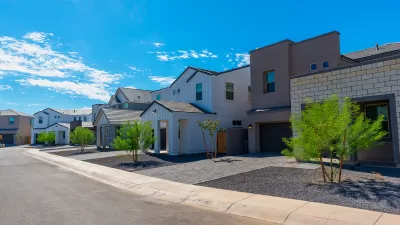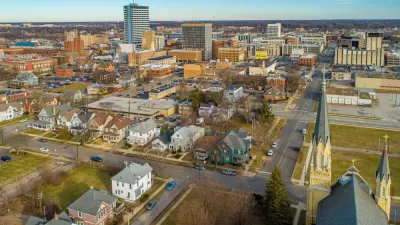Beauty is often known to break the rules.

"Are tall buildings that tower above their surroundings inappropriate?"
That's the question posed by Daniel Herreges to commence an article that scores provocative points about a long-held belief in how cities segregate their tallest buildings to specific, discrete neighborhoods, usually the central business district (CBD).
Another question follows, about the kinds of landscapes, exemplified by towers of rocks surrounded by flat land, and how those landscapes are usually accepted as beautiful and compare to examples in cities where tall buildings are surrounded by shorter buildings.
The article relies on visuals to raise these potential hypocrisies and make the case for allowing more tall buildings in cities, even in neighborhoods outside the CBD.
But Herreges also uses words to persuade the reader: "The point is that the argument that tall buildings should not exist near short buildings for reasons of compatibility is fundamentally about subjective preferences, and we should be intellectually honest in recognizing that."
Herreges ties the discussion back to his own writing from March of this year, about the "garbage language" of planning, of which he includes "out of scale."
FULL STORY: Is This Development "Out of Scale"?

Maui's Vacation Rental Debate Turns Ugly
Verbal attacks, misinformation campaigns and fistfights plague a high-stakes debate to convert thousands of vacation rentals into long-term housing.

Planetizen Federal Action Tracker
A weekly monitor of how Trump’s orders and actions are impacting planners and planning in America.

Chicago’s Ghost Rails
Just beneath the surface of the modern city lie the remnants of its expansive early 20th-century streetcar system.

Bend, Oregon Zoning Reforms Prioritize Small-Scale Housing
The city altered its zoning code to allow multi-family housing and eliminated parking mandates citywide.

Amtrak Cutting Jobs, Funding to High-Speed Rail
The agency plans to cut 10 percent of its workforce and has confirmed it will not fund new high-speed rail projects.

LA Denies Basic Services to Unhoused Residents
The city has repeatedly failed to respond to requests for trash pickup at encampment sites, and eliminated a program that provided mobile showers and toilets.
Urban Design for Planners 1: Software Tools
This six-course series explores essential urban design concepts using open source software and equips planners with the tools they need to participate fully in the urban design process.
Planning for Universal Design
Learn the tools for implementing Universal Design in planning regulations.
planning NEXT
Appalachian Highlands Housing Partners
Mpact (founded as Rail~Volution)
City of Camden Redevelopment Agency
City of Astoria
City of Portland
City of Laramie





























